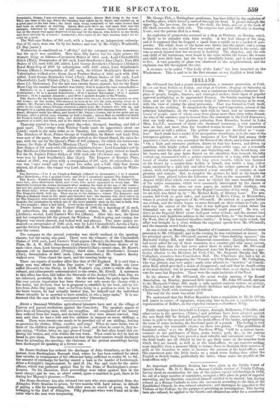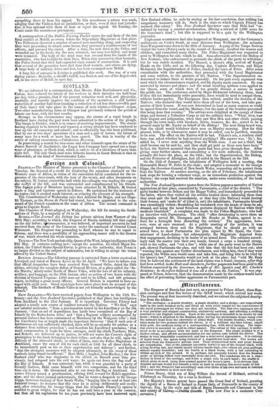IRELAND Mr. O'Connell has had a grand demonstration, a monster
procession, at Cork. He set out from Dublin on Friday, and slept at Carlow; sleeping on Saturday. at Fernley. His "progress," it is said, was a continuous triumphs—immense &s- plays of people, boughs, banners, and triumphal arches; those signs of popular approval multiplying as be approached Fennoy. On Sunday morning he heard mass, and set out for Cork; a moving body of followers increasing as he went, with the view of joining the great procession. That was formed in Cork itself betimes in the morning. It comprised the Mayor and Corporation, several of the principal inhabitants, all the trades each with its band, and an immense con- course of people, some of whom came from places snore than sixty miles distant. An idea of the numbers may be formed from the statement in the Cork Examiner, that one body alone, "the glorious gathering from Kinnelea, headed by Luke Shea, Ex-J.P., consisted of about two thousand horsemen, a vast number of men on foot, and more than five hundred women in cars." The total numbers are guessed at half a million. The private carriages are described as "count- less." Each trade had a model of its occupation ; sometimes, as in the case of the letterpress-printers, at work. The burgesses of Lee Ward had among their pageantry a bard, who was accounted the flower of the show; and is thus described. "On a high and extensive platform, drawn by four bay horses, and driven by postilions with bright yellow uniforms and green velvet caps, sat a venerable minstrel, under the shade of an ivied and branching oak. His beard hung o'er his bosom, and his gray hairs floated on his shoulders from beneath his 1 conical cap, ornamented with a golden representation of a harp, with band tassel of similar material; under his long green mantle, which was fastened on his breast by a sceptre-form bodkin or brooch, was visible a long yellow tunic, encircled by a dark belt and silver buckle, the nether garment of a buff colour, with red-taped sandals—presented a tout ensemble of costume at 011C8 pleasing and antique. But, to complete the picture, he held in his hands the identical harp played before the Liberator at Tara on the memorable 15th of August 1843; from which ever and anon he elicited the most beautiful strains of his native mountains, which were constantly interrupted by the cheers of thousands." On the same car were pages' an ancient Irish chieftain, two Irish knights, and four members of the Repeal Committee of the ward. The car, we are told, was fitted up by "Mr. Michael Keily, of Blarney Lane." The pro- cession left Cork in good order, and marched to Rice's Cross, at Riverstown; where it awaited the approach o f Mr. O'Connell. He arrived at a quarter before one o'clock, and the trades began to move forward on their return to Cork; yet such was the extent of the line, that it was half-past four o'clock before the triumphal car, on which sat "this Liberator," could proceed ! He was set down at the Imperial Hotel about half-past seven o'clock; and the ancient bard, delivered a very highflown address in the vernacular Erse to "the fearless son of the West, Dan of the hundred bloodless battles." It being now eight o'clock, the affair was brought to a close, without the expected speech from Mr. O'Connell; and the immense crowd broke up.
At one o'clock on Monday, in the Chamber of Commerce several addresses were presented to Mr. O'Connell; and in the evening he was entertained at dinner. In his principal speech, Mr. O'Connell sneered at the "three-farthing measure" the Ilaynootli College Bill, and other Ministerial concessions; likening Ireland, who had never asked for any of these measures, to a country-girl with many suitors, who told them that she had never asked them to marry her. Mr. O'Connell advised his followers to return to Parliament none but &peelers; making a par- ticular allusion to the Members for Cork City, Mr. Sergeant Murphy and-Mr. Callaghan absentees from Conciliation Hall. The Chairman also had a hit at Mr. Callaghan, while proposing the "County and City Members." Mr. Callaghan, who was present, was very angry; made some allusion to "brawlers" at Concili- ation Hall, which provoked a storm of disapproval; and said that he should retire at the next election: but he promised, that even after that, as an elector, he would vote for none but Repeaters. These were the main incidents of thelbast.
In the absence of Mr. O'Connell, the usual weekly meeting of the Repeal Association, on Monday, possessed little interest. Mr. John O'Connell, apropos to the Maynooth College Bill, made a sally against eminent writers on geology, who, he said, had not only treated Catholic doctrines and principles, but those of Christianity itself, with contempt and ridicule. The rent for the week was about 370/.
We understand that the Belfast Repealers have a requisition to Mr. D. O'Con- nell junior in course of signature, requesting him to become a candidate for the representation of Belfast, on the expected vacancy.—Northern
Public meetings have been held in Lurgan, Armagh, Ballymena, Coleraine, and other towns in the province, [Ulster,.] and petitions have been adopted against the new Bank Bill for Ireland, particularly against the clauses restricting the issues in gold to the amount held at the head-offices of the banks, andprohibiting the issue of notes including the fractional parts of a pound. The feeling is very strong among the mercantile classes on those two points. "The prohibition of fractional notes," sus the Belfast Northern Whig, "will be a serious incon- venience to the purchasers ofT linen, grain, butter, pork, &c., in the various markets, to whom they have proved a most valuable and convenient issue." "As the Irish banks are all obliged by law to pay their notes at the branches from which they are issued, as well as at the head-offices, we can conceive nothing more impolitic than a measure likely to induce them to diminish their reserves of gold at the branches in order to Increase the amount at the head-offices; and this enactment puts the Irish banks on a much worse footing than either the English or Scotch banks, particularly the latter, whose notes are payable at the head-offices only."
An important preliminary decision has been given in the Dublin Court of Queen's Bench. 31r. D. C. Heron, a Roman Catholic student of Trinity College, having stood an examination for one of the sixteen vacant scholarships in 1843, he, out of a large number of candidates, occupied a fifth place in point of superior answering, and he therefore conceived himself entitled to be elected; but, having refused as a Roman Catholic to take the sacrament according to the rites of the Established Church, he was refused admission; and thereupon he appealed to the Visitors of the College, for the purpose of procuring an investigation. This having been also refused, he applied to the Court; and obtained an order for a mandamta compelling them to hear his appeal. To this mandamus a return was made, alleging that the Visiters had no jurisdiction, or that, even if they had jurisdic- tion, it was optional with them to hear or reject the appeal. On Tuesday, the Court made the mandamus peremptory.
A correspondent of the Dublin Evening Packet states the real facts of the late fatal conflict at Mohill, as sworn before the Stipendiary Magistrate at that place. Two Policemen observed a number of armed men marching along, and suspecting they were proceeding to attack some house, they procured a reinforcement of two officers, and pursued the crowd. After a time, the mob fired at the Police, and wounded one in the head; the fire was returned, one man was killed, and many mere wounded. The body of the dead man was rescued from the hands of the constables who had to fight for their lives. When they returned to their barracks, the Police 'found that they had expended sixty rounds of ammunition. It is said that several of the peasantry have died from their wounds, and others are dying. A large body of military, horse and foot, has been encamped near Ilohill. A long list of outrages in Leitrim is published this week. One was of a very daring nature: Reynolds, a sheriff's bailiff, was fired at, and one of his fingers shot off, in the street of Mullin, in open day.



























 Previous page
Previous page